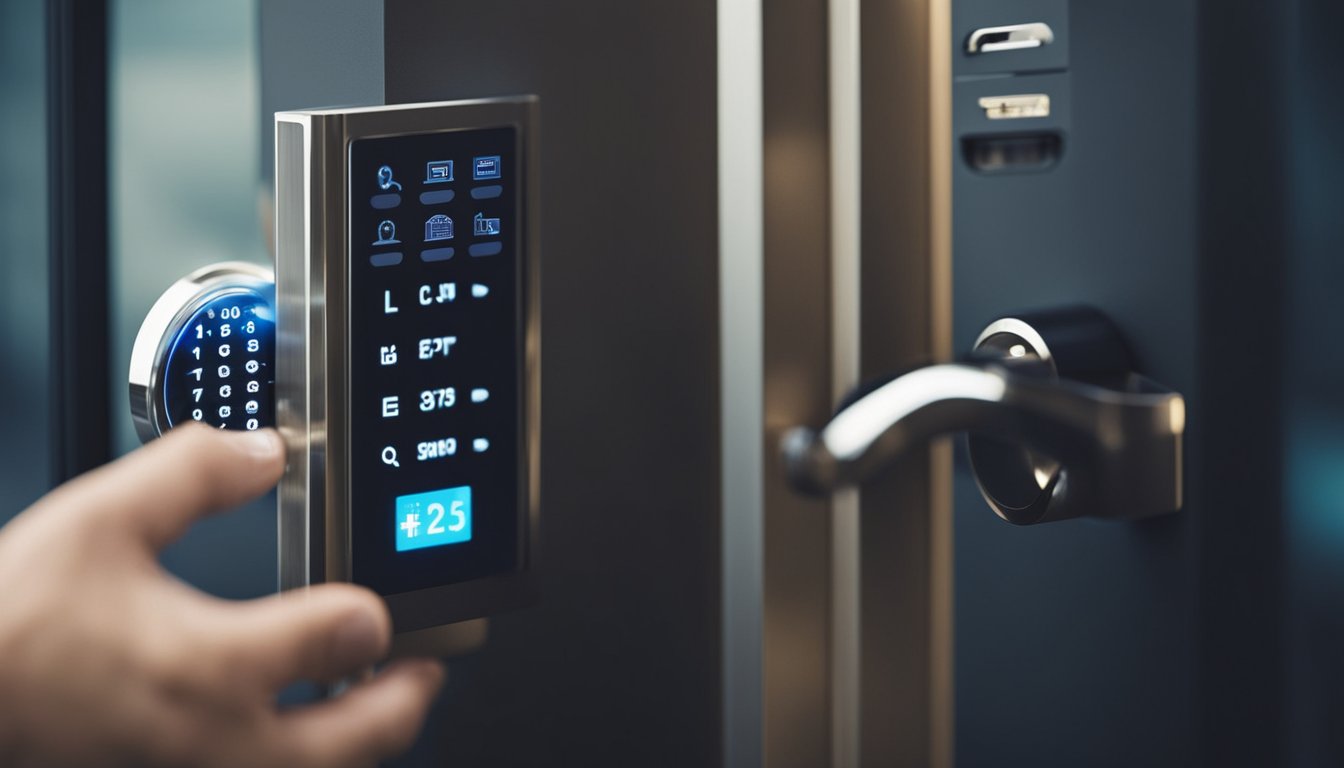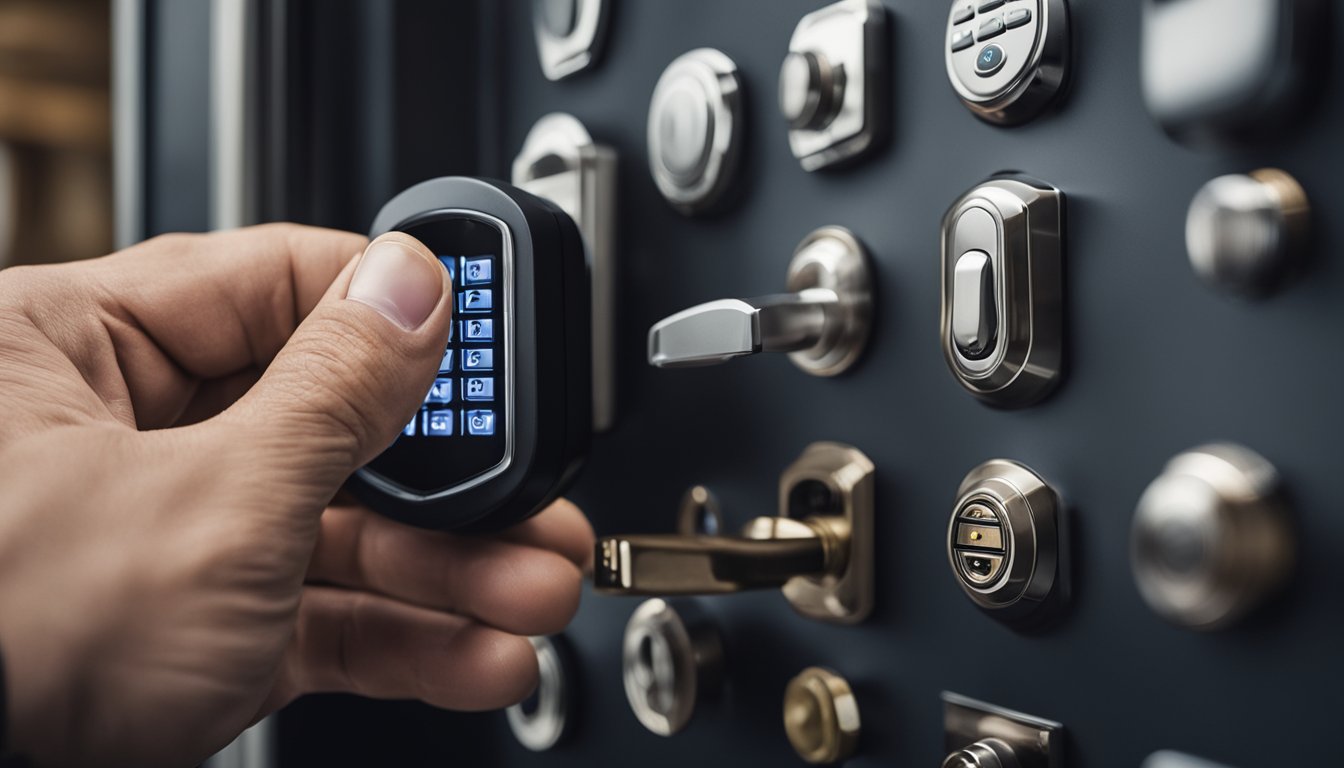Late updated: 10 Apr 2025 10:04
Written by: Elena Prescott
Exploring The Latest Trends In Locksmith Innovations: Advancements Shaping the Industry
In today's rapidly evolving world, locksmithing technology is undergoing a transformation. Our traditional view of locks and keys is being redefined by cutting-edge innovations. These modern advancements are shifting us towards a future where smart locks, biometric systems, and keyless entries are at the forefront of security solutions.

As we explore these innovations, it becomes evident that convenience and enhanced security are at the heart of this evolution. Keyless entry systems and digital locks are not just about eliminating the need for physical keys; they offer sophisticated control and customisation options that were previously unimaginable. These developments mark a significant shift in how we perceive and interact with security measures in our homes and businesses.
Locksmiths are also adapting to challenges brought by new technologies, including those related to cybersecurity and privacy concerns. The landscape of security is broadening, requiring professionals to expand their skills and stay updated with the latest digital security trends. Our journey through these innovations uncovers the balance between convenience, security, and personalisation that defines the modern locksmith industry.
Key Takeaways
- Smart locks and keyless entries are shaping modern security.
- Convenience and enhanced control are key benefits of new technologies.
- Locksmiths must adapt to digital trends and related challenges.
Emerging Technologies in Locksmithing

Locksmithing is undergoing significant change with advanced technologies transforming lock systems. Cutting-edge developments such as smart locks, biometric solutions, and integration with artificial intelligence are reshaping access control systems, enhancing both security and user experience.
Smart Locks and Keyless Entry Systems
Smart locks and keyless entry systems have revolutionised how we interact with locks. These technologies allow homeowners to manage access through their smartphones or devices like Amazon Alexa and Google Assistant, creating a seamless smart home experience. Supporting connectivity through Bluetooth, these systems enable remote access, adding convenience and enhancing security.
The rise in popularity of smart locks is largely due to their ability to offer enhanced control over home security. Users can easily change access codes, track who enters and exits, and receive real-time alerts about lock activities. This provides an added layer of security and peace of mind for users, demonstrating the innovative capabilities smart locks bring to the forefront of lock technology.
Biometric and Facial Recognition Solutions
Biometric authentication methods, including fingerprint and facial recognition, are increasingly integrated into lock systems. These technologies provide enhanced security by ensuring that access is granted only to authorised individuals. Unlike traditional keys, biometric solutions use unique personal features, greatly reducing the risk of unauthorised entry.
Facial recognition technology’s precision makes it a valuable component of modern access control systems. It not only improves security but also enhances customer experience by offering quick, keyless entry. As more homes and businesses adopt such solutions, reliability and accuracy continue to improve, solidifying their place in the future of locksmith innovations.
Integration of Artificial Intelligence
Artificial intelligence is playing a pivotal role in advancing lock technology. AI integration allows these systems to learn and adapt to users’ behaviours, enhancing security protocols and improving customer service. For instance, AI can detect unusual activity patterns, prompting alerts that help prevent potential security breaches.
AI’s capability to provide real-time alerts represents a significant leap in home security. This technology ensures that any suspicious activity is promptly reported, allowing for immediate action. Our embrace of AI in locksmithing not only upgrades traditional locking mechanisms but also transforms how security is managed on a day-to-day basis.
The Role of the Internet of Things
The integration of the Internet of Things (IoT) in locksmith systems offers remarkable advantages. IoT allows devices to communicate seamlessly within a smart home ecosystem, thereby enhancing the overall security network. This connectivity ensures that users can control and monitor lock systems remotely, providing a comprehensive view of their home security status.
With IoT, locks can work in conjunction with other security devices like cameras and alarms. This collaboration not only strengthens home security but also streamlines user experience, making technology-driven access control more efficient and reliable. As IoT continues to evolve, its role in modern locksmithing becomes increasingly indispensable, offering both convenience and advanced protection.
Challenges and Considerations for Locksmiths

Locksmiths face multiple challenges today, especially with the rapid advancement in technology and evolving consumer preferences. Our industry must consistently adapt to surging demands for innovative products and maintain robust security standards while effectively managing resources.
Adapting to Customer Demands
In recent years, the locksmith sector has witnessed a shift in customer preferences. Consumers now prioritise digital solutions such as smart locks and keyless entry systems over traditional mechanical locks. We need to adapt our inventory and services to align with these trends. Offering a wider range of security solutions including automated systems and integration with smart home technologies enhances the customer experience and satisfaction.
Timely training is essential to ensure our team members are equipped to handle advanced security technologies confidently. Customers expect seamless installation and support services. Therefore, staying updated with the latest industry innovations and maintaining a diverse skill set is crucial in satisfying current market demands.
Security and Privacy Concerns
As locksmithing increasingly involves digital systems, we must be vigilant about cybersecurity and data privacy. Smart locks and security cameras add convenience but also introduce vulnerabilities that need attention. It is vital to implement robust security measures to safeguard customer data and maintain trust.
We must adopt best practices for installing and configuring security features, ensuring they meet stringent privacy standards. Offering advice and solutions on security optimisation can position us as trusted experts in the field. Addressing concerns upfront reassures our clients and establishes a reliable locksmith service that prioritises customer safety.
Inventory Management and Training
Effective inventory management is key to delivering efficient locksmith services. We need to balance stocking advanced security products without overcommitting resources. This requires a strategic assessment of market trends and a clear understanding of customer needs to guide our inventory decisions.
Continuous training programs help ensure our teams remain skilled in new technologies and methods. As the industry constantly evolves, training is essential to adapt to and implement emerging trends. This commitment to education cements our expertise in the eyes of our clients and enables us to offer cutting-edge solutions tailored to their needs.
Frequently Asked Questions

In recent years, locksmith technologies have progressed significantly. They now encompass smart lock innovations, mobile tech integration, and biometric systems. Let's dive into these queries for a detailed understanding.
What advancements have been made in smart lock technology recently?
Smart locks have seen impressive progress with features like remote access control, integration with home automation systems, and enhanced encryption techniques. Users can now manage locks using their smartphones or other connected devices, providing both convenience and security.
How are modern locksmiths integrating mobile technology into their services?
Mobile technology has become a pivotal aspect of locksmith services, allowing technicians to offer on-the-go support. Many locksmiths use apps for booking and managing appointments, tracking service history, and offering real-time updates to clients.
What are the latest security protocols for electronic access control systems?
Recent electronic access control systems utilise advanced security protocols, including multifactor authentication and encryption. These measures ensure that only authorised individuals can gain access, with logs keeping track of each entry and exit for added security.
Which innovative tools are now available for locksmiths to enhance security?
Locksmiths have access to modern tools such as digital key cutters, smart diagnostic kits, and software for electronic system management. These tools enable more precise work and can enhance the overall security infrastructure of a property.
How is biometric technology being utilised in contemporary locking mechanisms?
Biometric technology is increasingly used in locks, integrating features like fingerprint recognition and facial recognition. This provides a high level of security by ensuring that only specific individuals with registered biometric data can access the secured area.
What steps are being taken to ensure the cybersecurity of digital locks?
Significant efforts are made to bolster the cybersecurity of digital locks by employing sophisticated encryption algorithms and regular software updates. These practices are crucial for protecting against hacking attempts and ensuring the integrity of smart lock systems.
